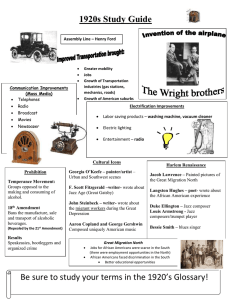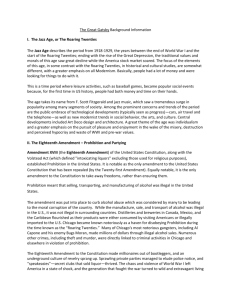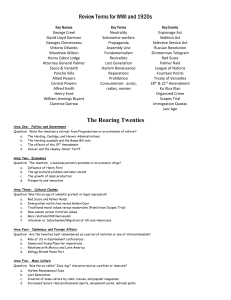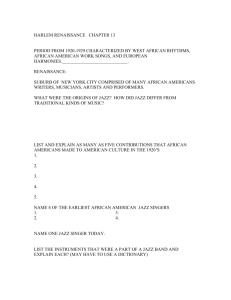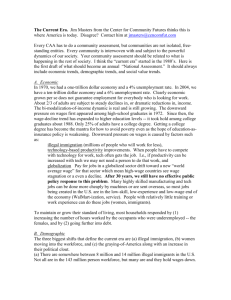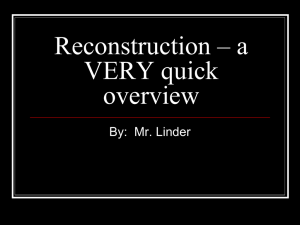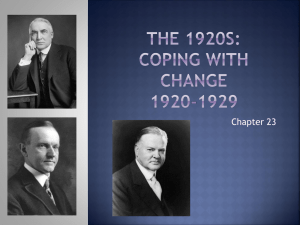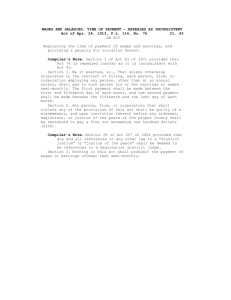Chapter 11 The Twenties
advertisement
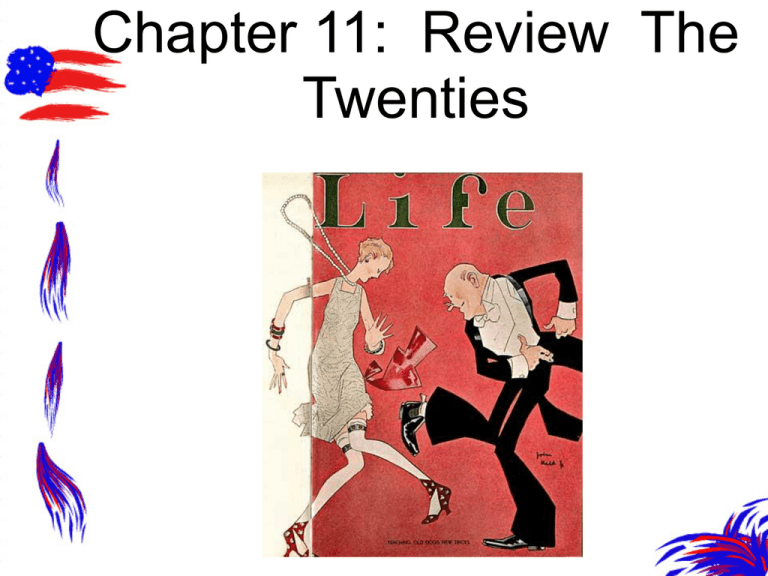
Chapter 11: Review The Twenties 2. • They followed a laissez-faire policy of not restricting business. • They preferred to be umpires instead of guardians helping the public. • Presidents should not actively lead. 3. • Jazz Age • Roaring Twenties • Era of Wonderful Nonsense 4. • Moving assembly line moved materials quickly to the men where they could add parts which were delivered to their stations • Above average wages for employees (he paid up to $5.00 a day) 5. • Washington Naval Treaty (control Japan) • Kellogg-Briand Pact (outlawed war) • U.S. followed an isolationist policy of avoiding other nations in order to avoid another war. 6. • Fear of communists • Cut back on immigration from central and eastern Europe. • Deported those suspected of being dangerous. 7. • Set a percentage of people allowed in from a country. • Southern and Eastern Europeans 8. • Two Italian anarchists arrested for burglary and robbery • Many were convinced that they were convicted and executed because of their political beliefs, not because of the evidence against them 9. • Short recession right after WWI ended • The country then experienced a time of prosperity as businesses expanded , workers had jobs, wages went up, and more products were produced • Farmers 10. • Jazz music (records on phonographs) • Nickelodeons or Movie Palaces • Talking movies began in 1927 with Al Jolson in The Jazz Singer • Radio (KDKA in Pittsburgh was the first official radio station in 1920. 11. • Writers who believed Americans were obsessed with money and material things • People didn’t appreciate the arts • Many left the U.S. and relocated in Paris. 12. • Rebirth of black culture in literature and art • Helped unify African Americans by giving them more pride in their heritage • Looked at the pains and joys of being black in America 13. • African American leader who favored a black nation • Self-respect, economic power, and independence were the goals of his Negro Nationalism 14. • Spread to northern cities • Now targeted Catholics, Jews, and immigrants 15. • First solo nonstop across the Atlantic • First woman to fly solo across the Atlantic 16. • Trial of Scopes, a teacher who read Darwin’s Theory of Evolution to his class which violated the law. • Fundamentalism (religion) v. modernism (science) • Bryan – prosecution, for the Bible • Darrow – defense, for evolution 17. • Started by 18th Amendment when alcohol was illegal • Increased crime • Showed difference between urban and rural areas • Bootleggers – sold illegal alcohol • Speakeasies – illegal bars • Government agents • Most successful at breaking up bars 18. • Could vote • New job opportunities • More freedom from household and family duties • Divorce rates increased • Job discrimination and low wages were still a problem 19. • Teapot Dome over oil fields • Veterans’ Bureau over money for veterans’ hospital • Attorney General selling pardons, paroles, and covering up liquor violations 20. • Made people want the new products like refrigerators, radios, washing machines • Appealed to emotions and insecurities to get people to buy • Installment buying – put a little down and paid the rest in monthly installments • People now had more opportunities for entertainment and standard of living rose 21. • Money paid for war damages • Britain and France couldn’t pay their war debts to us because Germany couldn’t pay them • Under the Dawes Plan, we loaned money to Germany so they could pay reparations to them so they could pay us. 22. • Employers now gave workers paid vacations, health care, and higher wages. • There were fewer strikes and union membership dropped. 23. • Urban to suburbs (mainly due to the automobile) • Great Migration of African Americans from South to North 24. • Needed better education for the higher paying urban jobs which needed more math and science • Rural areas still relied on teaching the 3 Rs (reading, writing, arithmetic) Social Effects • Deal with people and relationships –Red Scare –Great Migration –Racial Tensions –Harlem Renaissance –Rural/urban split –Increased educational opportunities Political Effects • 18th Amendment (which also had social effect – more crime) • 19th Amendment (which also had social effect – equality) • Immigration restrictions (quotas) • Sacco and Vanzetti conviction • Harding scandals • Ohio Gang Economic Effects • • • • • Consumer revolution Installment buying Prosperity Bull market Advertising became big business • Welfare capitalism
